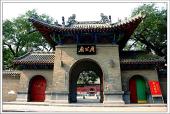 | King Wu (1087-1043 BC) King Wu of Zhou, born as Ji Fa, was the second son of King Wen and the first sovereign of the Chinese Zhou Dynasty. He ruled the country for 19 years. After ascending to the throne, King Wu tried to accomplish his father’s dying wish, the defeat of the Shang Dynasty. King Wu was also an able and enlightened administrator. He made the Kingdom of Zhou further developed
|
assisted by Jiang Ziya and his uncle Duke Zhou. The last monarch of the Shang Dynasty, King Zhou, is said to have been a cruel leader, who neglected state affairs and responsibilities, chosing to indulge himself instead. In 1048 BC, King Wu called for a meeting of the surrounding dukes at Meng Jin. More than 800 dukes came to the meeting. In 1046 BC, seeing that the Shang government was in a shambles, King Wu launched an attack along with many neighboring dukes. In the Battle of Muye in today’s Henan Province, Shang forces were destroyed, and King Zhou of Shang set his palace on fire and burned himself to death. It is a famous incident called “King Wu attacks King Zhou” in history.
King Wu founded the Zhou Dynasty in 1046 BC, and located his capital in Hao (southwest of today’s Xi’an, Shaanxi Province). This era, until the capital was moved eastward to Luoyang in 770 BC, is known as that of the Western Zhou Dynasty.
Kings Wen and Wu were the founders of Zhou Dynasty. They are admired by people for thousands of years as the symbol of enlightened and righteous rulers. |